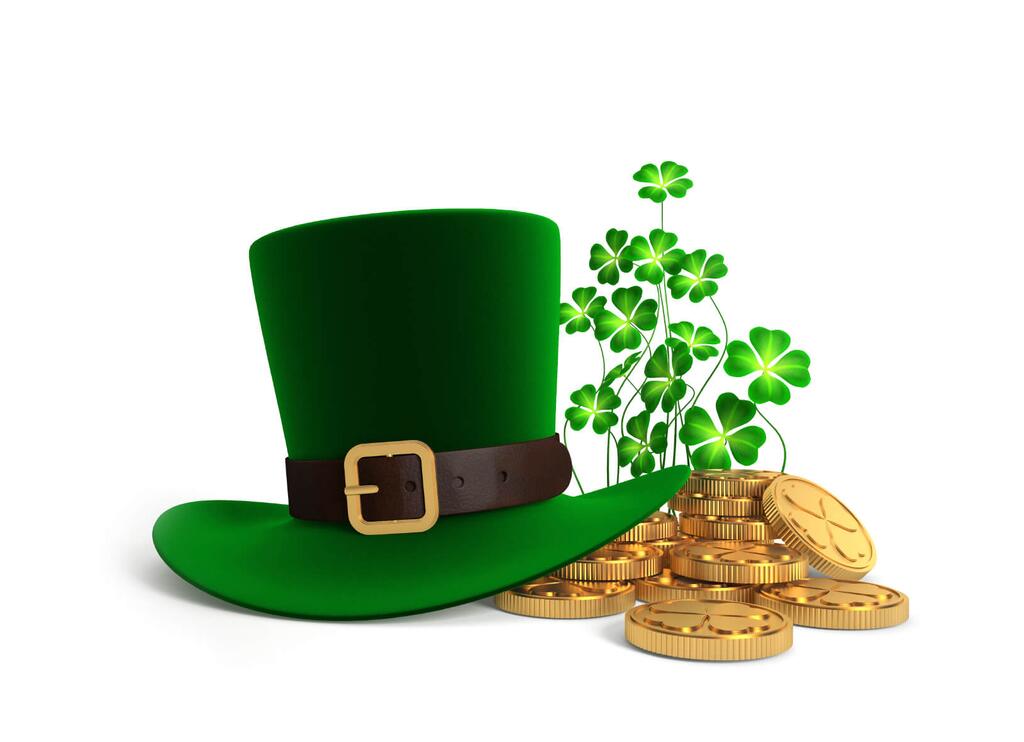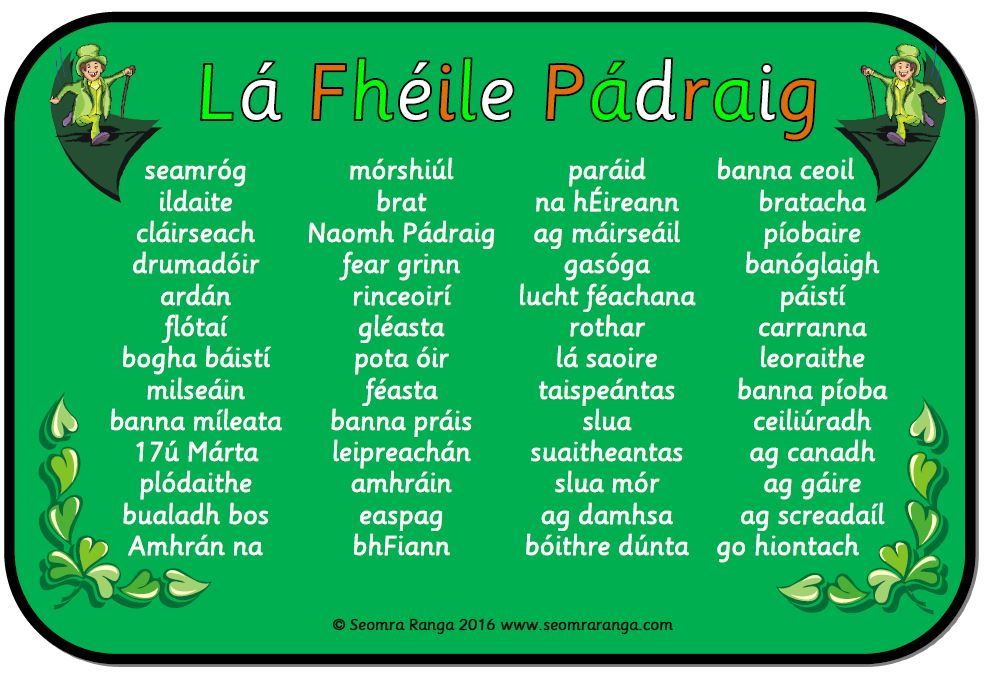Gallery
Photos from events, contest for the best costume, videos from master classes.
 |  |
 |  |
 |  |
 |  |
 |  |
 |  |
How to say ‘Happy St Patrick’s Day’ in Irish. If you want to wish a friend or colleague a happy St Patrick’s Day in Irish today, the most common greeting would be “Lá Fhéile Pádraig Check 'Lá Fhéile Pádraig' translations into English. Look through examples of Lá Fhéile Pádraig translation in sentences, listen to pronunciation and learn grammar. Literal Meaning: “Happy St. Patrick’s Day to you” (singular) When addressing multiple people, you would use: “Lá Fhéile Pádraig Sona Daoibh” Pronunciation: Law Ay-lah Paw-drig Sun-ah Deev; Literal Meaning: “Happy St. Patrick’s Day to you all” (plural) A shorter, less formal variation you might hear is: “Lá ‘le Pádraig "Beannacht" means "Blessing" "L Fhile Pdraig" should be "Lá Fhéile Pádraig" which means "St. Patricks Day" The proper way to wish some a happy St Patrick's day is: Beannachtaí na Féile The phrase in Irish Gaelic is "Lá Fhéile Pádraig Sona Duit!" (pronounced: Law Ale-yeh Pawd-rig Sunna Ditch). This translates directly to "Happy St. Patrick's Day to you!" For those who are particularly keen on getting the pronunciation just right, the phrase "Lá Fhéile Pádraig Sona Duit" can be broken down as follows: Lá (Law) - Day Sona meanwhile, translates as “happy” and Dduit means “to you” when used in a one-on-one conversation. This St. Patrick’s Day greeting is pronounced as lah leh PAH-drig SUN-uh gwitch. 2. Lá Fhéile Pádraig sona daoibh – Happy St. Patrick’s Day to you! (Addressing a group of people) Learn how to pronounce "Lá Fhéile Pádraig sona duit" with the American Pronunciation Guide!The American Pronunciation Guide is devoted to descriptive linguis A common way to say “Happy St. Patrick’s Day” in Irish is “Lá Fhéile Pádraig sona duit,” pronounced “Lah fay-luh Paw-drig sun-uh gwitch.” That’s if you’re saying it to just one person – how you say it to more than one person differs. Here are are a mix of casual and formal St. Patrick’s Day greetings. 1. Simply change the word "duit" to "daoibh" which also means "to you," but in the plural form, giving you: “Lá Fhéile Pádraig sona daoibh. Pronounce this Irish greeting as “Law leh Paw-drig The True Meaning of St. Patrick’s Day. For many, St. Patrick’s Day is an excuse to wear green, drink Guinness, and wave a shamrock. But beneath the surface, it’s a day steeped in history and meaning. It is a day of remembrance, marking the man who brought Christianity to Ireland. It is a celebration of Irish identity, both at home and abroad. Lá Fhéile Pádraig Sona Duit! Law Ale-yeh Pawd-rig Sunna Ditch! Happy St. Patrick's Day! (singular) Lá Fhéile Pádraig Sona Daoibh! Law Ale-yeh Pawd-rig Sunna Deev! Happy St. Patrick's Day! (to two or more people) Here are several more expression that might help on the day: lá saoire law see-ra holiday (a single day, not a vacation) President Donald Trump took to Twitter Friday to wish his "great Irish friends" a "Happy Lá Fheile Phadraig," which is an Irish phrase that means "the Day of the Festival of Patrick." Lá Fhéile Pádraig Sona Daoibh. When we want to wish a Happy St Patrick’s Day to more than one person or to a group of people, we use the phrase ‘Lá Fhéile Pádraig Sona Daoibh’. This is similar to the previous phrase, apart from changing ‘duit’ to ‘daoibh’ which puts it in the plural form. Beannachtaí na Féile Pádraig ort To wish someone a happy St Patrick’s Day in Irish, or as Gaeilge, say: “Lá fhéile Pádraig sona dhuit!” “Lah fay-luh Paw-drig sun-uh gwitch.” To propose a St Patrick’s Day toast, lift your glass and say: “Sláinte!” “Slawn-che.” Lá ‘le Pádraig sona daoibh! Happy St. Patrick’s Day to all of you! It would be sona duit, if to one person: Lá ‘le (short for fhéile – féile is feast (pronounced: fayluh)) Pádraig sona duit (pr: law luh Pawric sunna ghit(ch)) ‘Sona daoibh’ is pronounced ‘sunna gheefv.’ “Lá Fhéile Pádraig” means “St. Patrick’s Day”. “Sona” means “Happy” in English. When saying “to you”, we use either “duit” (singular) or “daoibh” (plural). If you’re speaking to more than one person, you change the phrase slightly, to “Lá Fhéile Pádraig Sona Daoibh!”. Lá Fhéile Pádraig - St. Patrick's Day Today is St. Patrick's Day, so today we will discover some relevant vocabulary as well as how the Irish celebrate and the history of the holiday. Who is St. Patrick? St. Patrick is the Romano-British patron saint of Ireland, and is credited with bringing Christianity to the island The Irish phrase, "La Fheile Padraig Sona Duit", literally translates to "Happy St. Patrick's Day to you" in English. Here is a breakdown of the phrase: "La" means "Day" "Fheile" means "Festival" or "Feast" "Padraig" is the Irish name for Patrick, referring specifically to St. Patrick "Sona" means "Happy" "Duit" translates to "to you" Learn more: Note that you could also shorten this to “Lá ‘le Pádraig” in this saying and any other. The meaning is the same, but native Irish speakers often use the latter as a way of shortening the term to something more natural and casual. Sona means “happy” in English. Dhuit means “to you,” when the “you” being referred to is singular. Simply change the word "duit" to "daoibh" which also means "to you," but in the plural form, giving you: “Lá Fhéile Pádraig sona daoibh.” Pronounce this Irish greeting as “Law leh Paw-drig suna yee-uv." A St Patrick's Day blessing in Irish
Articles and news, personal stories, interviews with experts.
Photos from events, contest for the best costume, videos from master classes.
 |  |
 |  |
 |  |
 |  |
 |  |
 |  |